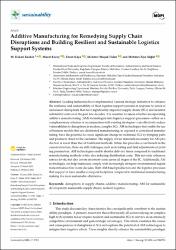Additive manufacturing for remedying supply chain disruptions and building resilient and sustainable logistics support systems
Citation
Keskin, M.H.; Koray, M.; Kaya, E.; Fidan, M.M.; Söğüt, M.Z. Additive Manufacturing for Remedying Supply Chain Disruptions and Building Resilient and Sustainable Logistics Support Systems. Sustainability 2025, 17(6), 2783.Abstract
Leading industries have implemented various strategic initiatives to enhance
the resilience and sustainability of their logistics support systems in response to series of
unforeseen disruptions that have significantly impacted supply chains (SCs) and incurred
substantial costs over the past few decades. It is essential to assess whether incorporating
additive manufacturing (AM) technologies into logistics support processes—either as a
complementary solution or in conjunction with existing strategies—can effectively reduce
vulnerabilities to disruptions in modern, complex SCs. AM technologies that enable the use
of business models that use distributed manufacturing, as opposed to centralized manufac turing, have the potential to create significant change in traditional SCs by bringing parts
and products closer to the customer. The supply of raw materials necessary for AM pro duction is lower than that of traditional methods. While this provides a cost benefit in the
current structure, there are still challenges, such as in testing and final adjustments of print ing parameters. AM technologies enable shorter delivery times compared to traditional
manufacturing methods while also reducing distribution costs. This not only enhances
service levels, but also lowers inventory costs across all stages of the SC. Additionally, AM
technologies can help businesses comply with increasingly stringent environmental regula tions introduced in recent decades. Both AM-based production and the logistics processes
that support it have smaller ecological footprints compared to traditional manufacturing,
making it a more sustainable alternative.
Source
SustainabilityVolume
17Issue
6URI
https://www.mdpi.com/2071-1050/17/6/2783https://doi.org/10.3390/su17062783
https://hdl.handle.net/20.500.12780/1078


















